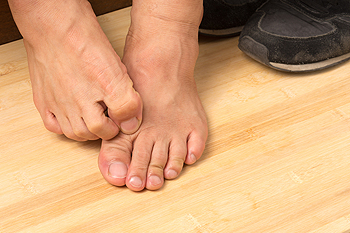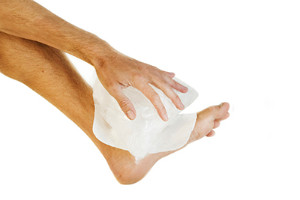Blog
Tips for Stronger and Healthier Feet
 Dancers spend a lot of time on their feet, and it is important that they know how to take care of them in order to prevent injuries. One of the best ways to prevent injury is to wear appropriate shoes that will take the pressure off your feet. If you are looking to maintain strong feet, you can try doing some stretches to improve your stability and strength. Some exercises that you may find helpful are calf muscle stretches and resistance band exercises. Nevertheless, if you suspect that you have any sort of lingering pain in your feet, you should seek help from your podiatrist right away.
Dancers spend a lot of time on their feet, and it is important that they know how to take care of them in order to prevent injuries. One of the best ways to prevent injury is to wear appropriate shoes that will take the pressure off your feet. If you are looking to maintain strong feet, you can try doing some stretches to improve your stability and strength. Some exercises that you may find helpful are calf muscle stretches and resistance band exercises. Nevertheless, if you suspect that you have any sort of lingering pain in your feet, you should seek help from your podiatrist right away.
Everyday foot care is very important to prevent infection and other foot ailments. If you need your feet checked, contact one of our podiatrists from Pennsylvania. Our doctors can provide the care you need to keep you pain-free and on your feet.
Everyday Foot Care
Often, people take care of their bodies, face and hair more so than they do for their feet. But the feet are a very important aspect of our bodies, and one that we should pay more attention to. Without our feet, we would not be able to perform most daily tasks.
It is best to check your feet regularly to make sure there are no new bruises or cuts that you may not have noticed before. For dry feet, moisturizer can easily be a remedy and can be applied as often as necessary to the affected areas. Wearing shoes that fit well can also help you maintain good foot health, as well as making it easier to walk and do daily activities without the stress or pain of ill-fitting shoes, high heels, or even flip flops. Wearing clean socks with closed shoes is important to ensure that sweat and bacteria do not accumulate within the shoe. Clean socks help to prevent Athlete’s foot, fungi problems, bad odors, and can absorb sweat.
If you have any questions please feel free to contact one of our offices located in Plymouth Meeting and Ambler, PA . We offer the newest diagnostic and treatment technologies for all your foot and ankle needs.
The Importance of Podiatrists
 Podiatrists are known for treating and diagnosing conditions in the foot and ankle. In order to become a podiatrist, one has to complete four years of training in podiatry school and three years of hospital training. Some podiatrists specialize in certain areas such as pediatrics, sports injuries, wound care, and diabetic care. It is possible for podiatrists to earn board certification by undergoing advanced training and taking an exam. The two boards that are able to certify podiatrists are the American Board of Foot and Ankle Surgery and the American Board of Podiatric Medicine.
Podiatrists are known for treating and diagnosing conditions in the foot and ankle. In order to become a podiatrist, one has to complete four years of training in podiatry school and three years of hospital training. Some podiatrists specialize in certain areas such as pediatrics, sports injuries, wound care, and diabetic care. It is possible for podiatrists to earn board certification by undergoing advanced training and taking an exam. The two boards that are able to certify podiatrists are the American Board of Foot and Ankle Surgery and the American Board of Podiatric Medicine.
If you are experiencing pain in the feet or ankles, don’t join the stubborn majority refusing treatment. Feel free to contact one of our podiatrists from Pennsylvania. Our doctors can provide the care you need to keep you pain-free and on your feet.
What Is a Podiatrist?
Someone would seek the care of a podiatrist if they have suffered a foot injury or have common foot ailments such as heal spurs, bunions, arch problems, deformities, ingrown toenails, corns, foot and ankle problems, etc.
Podiatric Treatment
A podiatrist will treat the problematic areas of the feet, ankle or lower leg by prescribing the following:
- Physical therapy
- Drugs
- Orthotic inserts or soles
- Surgery on lower extremity fractures
A common podiatric procedure a podiatrist will use is a scanner or force plate which will allow the podiatrist to know the designs of orthotics. Patients are then told to follow a series of tasks to complete the treatment. The computer will scan the foot a see which areas show weight distribution and pressure points. The podiatrist will read the analysis and then determine which treatment plans are available.
If you have any questions please feel free to contact one of our offices located in Plymouth Meeting and Ambler, PA . We offer the newest diagnostic and treatment technologies for all your foot and ankle needs.
The Importance of Having Good Blood Circulation
 Blood circulation is an essential bodily function since it supplies the body’s vital organs with enough oxygen and nutrients needed to operate. Poor blood circulation can potentially harm the heart, kidneys, and brain, and it may even have fatal consequences if left untreated. One of the most common signs of poor circulation is numbness in the hands and feet. This is often the result of compressed nerves, extreme coldness, a lack of magnesium, and vitamin B12 deficiency. Another obvious sign of poor circulation is swelling in the lower extremities. If you notice you have swelling, you should lay down and raise your legs up above your heart. Coldness in the hands and feet is another symptom of poor circulation that should not go unnoticed. A disruption of blood flow prevents the blood from reaching the furthest parts of the body, which are the fingers and toes.
Blood circulation is an essential bodily function since it supplies the body’s vital organs with enough oxygen and nutrients needed to operate. Poor blood circulation can potentially harm the heart, kidneys, and brain, and it may even have fatal consequences if left untreated. One of the most common signs of poor circulation is numbness in the hands and feet. This is often the result of compressed nerves, extreme coldness, a lack of magnesium, and vitamin B12 deficiency. Another obvious sign of poor circulation is swelling in the lower extremities. If you notice you have swelling, you should lay down and raise your legs up above your heart. Coldness in the hands and feet is another symptom of poor circulation that should not go unnoticed. A disruption of blood flow prevents the blood from reaching the furthest parts of the body, which are the fingers and toes.
Poor circulation is a serious condition and needs immediate medical attention. If you have any concerns with poor circulation in your feet contact one of our podiatrists of Pennsylvania. Our doctors will treat your foot and ankle needs.
Poor Circulation in the Feet
Poor blood circulation in the feet and legs is can be caused by peripheral artery disease (PAD), which is the result of a buildup of plaque in the arteries.
Plaque buildup or atherosclerosis results from excess calcium and cholesterol in the bloodstream. This can restrict the amount of blood which can flow through the arteries. Poor blood circulation in the feet and legs are sometimes caused by inflammation in the blood vessels, known as vasculitis.
Causes
Lack of oxygen and oxygen from poor blood circulation restricts muscle growth and development. It can also cause:
- Muscle pain, stiffness, or weakness
- Numbness or cramping in the legs
- Skin discoloration
- Slower nail & hair growth
- Erectile dysfunction
Those who have diabetes or smoke are at greatest risk for poor circulation, as are those who are over 50. If you have poor circulation in the feet and legs it may be caused by PAD and is important to make changes to your lifestyle in order to reduce risk of getting a heart attack or stroke. Exercise and maintaining a healthy lifestyle will dramatically improve conditions.
As always, see a podiatrist as he or she will assist in finding a regimen that suits you. A podiatrist can also prescribe you any needed medication.
If you have any questions please feel free to contact one of our offices located in Plymouth Meeting and Ambler, PA . We offer the newest diagnostic and treatment technologies for all your foot and ankle needs.
Kris Bryant Suffers Ankle Sprain
 Cubs third baseman Kris Bryant recently suffered an ankle sprain that is expected to keep him out of gameplay for at least one week. It is possible that the Cubs organization will opt to place Bryant on the 10-day disabled list to allow him time to heal and to refill his spot on the active roster. Bryant suffered the injury when he rolled his ankle trying to catch a pop-up in foul territory. In regard to the amount of time he will be sidelined, the third baseman said, “It shouldn’t be too long — I don’t think it should be.”
Cubs third baseman Kris Bryant recently suffered an ankle sprain that is expected to keep him out of gameplay for at least one week. It is possible that the Cubs organization will opt to place Bryant on the 10-day disabled list to allow him time to heal and to refill his spot on the active roster. Bryant suffered the injury when he rolled his ankle trying to catch a pop-up in foul territory. In regard to the amount of time he will be sidelined, the third baseman said, “It shouldn’t be too long — I don’t think it should be.”
Ankle sprains are common but need immediate attention. If you need your feet checked, contact one of our podiatrists from Pennsylvania. Our doctors can provide the care you need to keep you pain-free and on your feet.
How Does an Ankle Sprain Occur?
Ankle sprains take place when the ligaments in your ankle are torn or stretched beyond their limits. There are multiple ways that the ankle can become injured, including twisting or rolling over onto your ankle, putting undue stress on it, or causing trauma to the ankle itself.
What Are the Symptoms?
- Mild to moderate bruising
- Limited mobility
- Swelling
- Discoloration of the skin (depending on severity)
Preventing a Sprain
- Wearing appropriate shoes for the occasion
- Stretching before exercises and sports
- Knowing your limits
Treatment of a Sprain
Treatment of a sprain depends on the severity. Many times, people are told to rest and remain off their feet completely, while others are given an air cast. If the sprain is very severe, surgery may be required.
If you have suffered an ankle sprain previously, you may want to consider additional support such as a brace and regular exercises to strengthen the ankle.
If you have any questions please feel free to contact one of our offices located in Plymouth Meeting and Ambler, PA . We offer the newest diagnostic and treatment technologies for all your foot and ankle needs.
